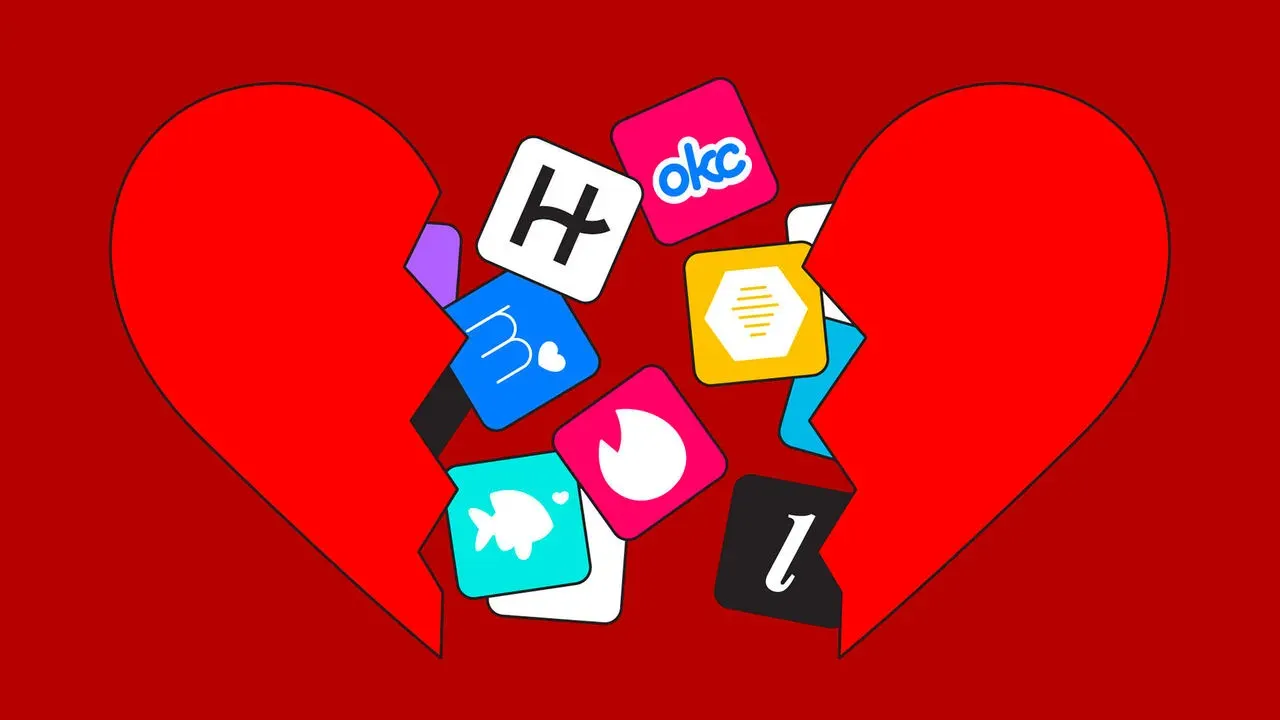Just before Christmas (so many in the dating industry may have missed it), the Financial Times posted a significant article called "How we fell out of love with dating apps" which stated how the biggest online dating companies are in crisis, as women and younger users look elsewhere, towards niche sites or real-life meets:
In early December, Match Group, the owner of more than 40 dating apps and by far the market leader in the world of online dating, held its first investor day since going public in 2015.
The major theme was that the next big shift in the business of romantic connections will be artificial intelligence — something the group is pushing hard. “AI is going to transform the dating experience. It’s going to enable us to make all aspects of the online dating journey better,” proclaimed chief executive Bernard Kim.
Behind those optimistic words, however, were some difficult realities. Although its brands now cater to tens of millions of users globally, Match’s market value — roughly $8bn — is just a fifth of what it was three years ago. Last month, Tinder, Match’s flagship brand and the app that arguably invented the modern dating industry, reported that paid user numbers had dropped on a year-on-year basis for the eighth consecutive quarter.
Summary
The article, "How We Fell Out of Love with Dating Apps," explores the declining popularity of traditional dating apps and the challenges faced by industry leaders like Tinder, Bumble, and Match Group.
It highlights a broader dissatisfaction among users, with many feeling "emotionally, mentally, or physically exhausted" by these platforms.
Key factors driving this disillusionment include user fatigue, lack of innovation, and increasing competition from niche or alternative options.
The Rise and Challenges of Dating Apps
Dating apps like Tinder revolutionised romantic connections with features like the swipe interface, which became an industry standard.
However, the initial excitement has faded, with companies struggling to retain users and sustain growth.
Tinder's user base has declined significantly since its peak of over 73 million monthly users in 2020, and its parent company Match Group's market valuation has plummeted by 80% in recent years.
Bumble, initially celebrated for its female-focused approach, has also seen its share prices drop and recently abandoned its signature feature of allowing only women to initiate conversations.
Both companies are investing in artificial intelligence (AI) as a potential savior for the industry, with AI-driven features aimed at improving matchmaking accuracy and user experience.
User Burnout and Changing Preferences
Many users, particularly women and younger demographics, are turning away from mainstream dating apps.
A 2023 survey revealed that 78% of respondents experienced some form of exhaustion from using these platforms. The repetitive and often unsatisfactory nature of app interactions has driven users toward real-life meetings, niche platforms, or even a complete withdrawal from dating.
Niche apps like Feeld, targeting open-minded individuals exploring non-traditional relationships, and Breeze, which facilitates in-person dates without prolonged online interactions, are gaining traction.
These alternatives emphasise authenticity and tangible experiences, diverging from the algorithm-heavy strategies of mainstream apps.
AI and the Future of Dating
AI has become a focal point for revitalising the industry.
Apps are leveraging AI to enhance user experiences through improved matchmaking, verification processes, and personalised recommendations.
For example, Grindr is developing AI-driven tools to analyse user data for better matches, while Hinge plans to use AI for deeper insights into user preferences.
Despite these advancements, there are concerns about AI’s ability to address the complexities of human relationships. Critics argue that algorithms often fail to capture the nuances of mutual attraction and compatibility. Additionally, allegations of apps prioritising engagement over genuine connections continue to erode user trust.
Broader Trends and Industry Shifts
The article underscores the challenge of aligning corporate goals with user satisfaction. While dating apps rely on a steady influx of new users for revenue, users increasingly demand meaningful and authentic connections.
This tension is compounded by demographic shifts, with younger generations showing less interest in online dating compared to previous cohorts.
Offline interactions are experiencing a resurgence, as evidenced by a sharp increase in attendance at singles events and speed-dating sessions. These trends indicate a growing nostalgia for traditional ways of meeting and connecting, which online platforms struggle to replicate.
My conclusion
The dating app industry faces a pivotal moment, with major players needing to address user dissatisfaction, innovate effectively, and adapt to changing preferences.
While AI offers potential solutions, the ultimate challenge lies in creating platforms that genuinely enhance human connections without compromising authenticity.
This is going to be a very, very difficult year for online dating companies.
I do not believe adopting AI features will be beneficial to consumers - users want authenticity and it will be very difficult for AI to be make the experience more authentic.
The Certain Decline of Match and Bumble
During my tenure running an online dating company from 2003 through 2014, we experienced extraordinary growth.
But to put it in context, those were boom years for the entire internet—broadband adoption in the U.S. more than doubled from 2003 to 2012, and online dating usage surged alongside it.
Our rapid expansion was not solely the result of our own innovations; it was propelled by a vastly expanding addressable market brought on by a “rising tide” of internet penetration worldwide.
Today, the dynamics are shifting.
According to Pew Research, roughly 70% of adults under 50 in the U.S. use social media regularly, with many increasingly relying on platforms like Instagram, TikTok, and even Facebook to meet new people.
Thanks to features like direct messaging and algorithmic discovery, these social apps allow for casual flirting and genuine connections—often without the stigma or cost of a dating-specific service.
For those who want a specialised experience, niche dating platforms are on the rise. Apps like Feeld, which has seen significant double-digit annual user growth since 2019, and newer contenders like Breeze, provide laser-focused solutions for specific relationship styles or demographics.
This level of curation spares users the need to sift through a massive “haystack” of casual users, as they might on mainstream apps like Tinder or Bumble.
When Tinder first launched, its innovative swipe format and mobile-first strategy distinguished it from legacy sites like Match.com and Plenty of Fish, igniting meteoric user adoption.
But fast-forward to today: Tinder and Bumble are now the mainstream giants, and history shows that once an innovative product becomes too ubiquitous, the next wave of challengers emerges—either more specialized or more broadly appealing.
With over 1 billion monthly active users on TikTok alone and over 2 billion on Instagram, it’s easy for younger audiences to meet others without ever touching a dedicated dating app.
Meanwhile, smaller niche apps are chipping away at the incumbents by delivering exactly what specific audiences want.
In effect, the market is bifurcating.
If people want a generic, “meet-anyone” experience, social media platforms offer scale and convenience at zero cost.
If they want highly tailored dating or relationship experiences, new niche apps serve those needs better than a generalised app can.
As a result, it’s entirely plausible that Tinder and Bumble—like the Match.coms of yesteryear—will see their market share decline in favour of hyper-focused dating solutions on the one hand and free, all-encompassing social platforms on the other.
If you would like to hear more of my perspective on the online dating industry, you can contact me via https://www.datingindustryexpert.com/






Comments